
Bad Brains are an American band formed in Washington, D.C., in 1976. They are widely regarded as pioneers of hardcore punk, though the band's members have objected to the use of this term to describe their music. They are also an adept reggae band, while later recordings featured elements of other genres like funk, heavy metal, hip hop, and soul. Rolling Stone magazine called them "the mother of all black hard-rock bands", and they have been cited as a seminal influence to numerous other subgenres in addition to hardcore punk, including various subgenres of heavy metal, such as thrash/speed metal, alternative metal, and funk metal. Bad Brains are followers of the Rastafari movement.
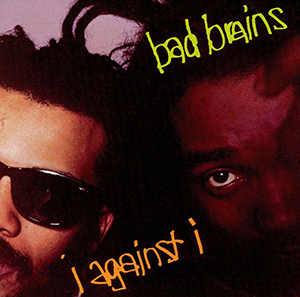
I Against I is the third studio album by the American rock band Bad Brains. It was released on November 21, 1986 through SST Records with the catalog number SST 065. The best-selling album in the band's catalog, I Against I finds the band branching out from their early hardcore punk style to touch on funk, soul, reggae and heavy metal. It is also included in the book 1001 Albums You Must Hear Before You Die. The title track was a Paul Rachman-directed video.
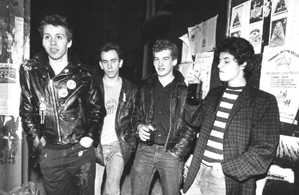
The Teen Idles were an American hardcore punk band formed in Washington, D.C., in September 1979. Consisting of teenagers Nathan Strejcek, Geordie Grindle, Ian MacKaye and Jeff Nelson, they recorded two demo sessions and the 1980 Minor Disturbance EP before breaking up in November 1980. The influential independent record label Dischord Records was originally created with the sole purpose of releasing The Teen Idles Minor Disturbance 7" record. They were an early landmark in the D.C. hardcore movement, and MacKaye and Nelson would later form the seminal punk rock outfit Minor Threat.

Paul D. Hudson, known professionally as H.R., is an American musician who leads the hardcore punk band Bad Brains, and is an instrumental figure in the development of the genre. His vocal delivery has been described as diverse, ranging from a rapid-fire nasal whine, to feral growling and screeches, to smooth near-crooning or staccato reggae rhymes. He has departed the band periodically to pursue solo efforts that are more reggae than Bad Brains' punk sound. He is the older brother of Earl Hudson, Bad Brains' drummer.

Bad Brains is the first album released by American hardcore punk/reggae band Bad Brains. Recorded in 1981 and released on the cassette-only label ROIR on February 5, 1982, many fans refer to it as "The Yellow Tape" because of its yellow packaging.

The Youth Are Getting Restless is a live album from hardcore punk and reggae pioneers Bad Brains. It was recorded at the Paradiso Theater in Amsterdam, the Netherlands, in 1987 by the VPRO. The show was part of the band's I Against I tour. It remains one of the group's best selling albums.
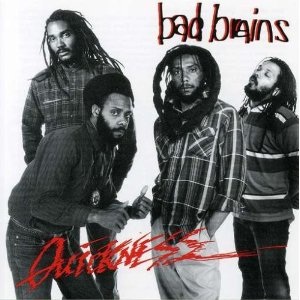
Quickness, also known as With the Quickness, is the fourth full-length studio album by hardcore punk pioneers Bad Brains. At the time of its release, it was the best selling Bad Brains album and also featured an MTV video for the lead-off track "Soul Craft" directed by Paul Rachman who later went on to produce and direct the feature documentary American Hardcore. Drummer Earl Hudson, though pictured on the cover, does not play on the record, as drum parts were instead performed by Mackie Jayson of the Cro-Mags. In an interview with MTV, guitarist Dr. Know said that the album's title comes from urgency and swiftness.

Rise is the fifth studio album by hardcore punk pioneers Bad Brains. It is the first Bad Brains album to be released on a major label and is notable for the absence of two original members: here, Israel Joseph I replaces vocalist H.R. and Cro-Mags drummer Mackie Jayson, who was a session musician on the band's previous album Quickness, replaces drummer Earl Hudson.

A Bad Brains Reunion Live at Maritime Hall is the third live album from hardcore punk and reggae pioneers Bad Brains. It marks the reunion of the band after a four-year breakup. At the time, the band were unable to use the name "Bad Brains" as they were embattled in legal turmoil with their prior management company. For over three years, the band had to tour under the name "Soul Brains" even though the original lineup of Bad Brains was intact.

I & I Survived is the seventh full-length studio album by hardcore punk band Bad Brains.

The Omega Sessions is a 5-song EP recorded by hardcore punk/reggae pioneers Bad Brains in 1980 and released in 1997. The tracks were recorded and mixed at the original Omega Recording Studios in Rockville, Maryland. The EP contains early versions of songs that eventually appeared on later releases, including a rendition of "I Against I," which would not appear on an official Bad Brains release for another six years.

Flex Your Head is a sampler album featuring early hardcore punk bands from the Washington, D.C., area. It was originally released in January 1982 on Dischord Records, with a pressing of 4,000 copies on vinyl record that sold out within one week; an additional 3,000 copies were released shortly after. In 1982, a third pressing of 2,000 copies was released under license in the United Kingdom by Alternative Tentacles. Each of the first three pressings featured a different front cover.

American Hardcore: The History of American Punk Rock 1980–1986 is a documentary directed and produced by Paul Rachman and written by Steven Blush. It is based on the 2001 book American Hardcore: A Tribal History also written by Blush. It world premiered at the 2006 Sundance Film Festival and was released on September 22, 2006 on a limited basis by Sony Pictures Classics. The film features some early pioneers of the hardcore punk music scene including Bad Brains, Black Flag, D.O.A., Minor Threat, Minutemen, SSD, and others. It was released on DVD by Sony Pictures Home Entertainment on February 20, 2007.

"Pay to Cum" is the debut single by Washington, D.C.-based hardcore punk band Bad Brains. It was released in June 1980 on Bad Brain Records. The single was recorded in New York City by Jimi Quidd at his Dots Studios.
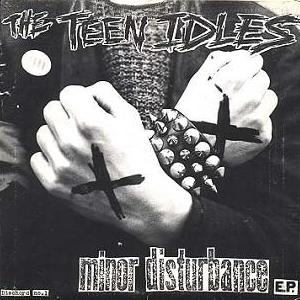
Minor Disturbance is the debut EP by the American hardcore punk band the Teen Idles, released in December 1980. It was the first release by Dischord Records. Comprising eight songs, Minor Disturbance referenced a number of issues pertinent to the band, from being turned away at local concerts due to their age to what they felt was the increasing complacency of many first wave punk bands. Upon its release, Minor Disturbance received positive reviews from local fanzines and gained airplay on local radio stations.
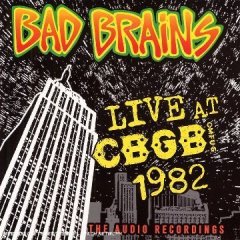
Live at CBGB 1982 is a live album and DVD capturing hardcore punk/reggae group Bad Brains in concert at the historic New York City club CBGB in December 1982. The show features several tracks from the first three Bad Brains albums - Black Dots, Bad Brains, and the soon-to-be-released Rock for Light. The album also contains previously unreleased material, such as the reggae tunes "King of Glory" and "I And I Rasta."

Banned In D.C. is a compilation of hardcore punk and reggae songs by Bad Brains.

Build a Nation is the eighth full-length studio album by hardcore punk pioneers Bad Brains. Released on June 26, 2007 on Megaforce Records with distribution by Oscilloscope Laboratories, it was produced by Adam Yauch of Beastie Boys, a longtime friend of the band. This album marked the 30th anniversary of the band.

This is a comprehensive discography of Bad Brains, a Washington, D.C.-based hardcore punk band that also plays reggae and uses styles of funk and heavy metal into their music. To date, the band has released nine full-length studio albums, four EPs, four live recordings, one compilation album, one demo album, and more than a dozen singles.
Sidney Alexander McCray was an American punk singer.



















